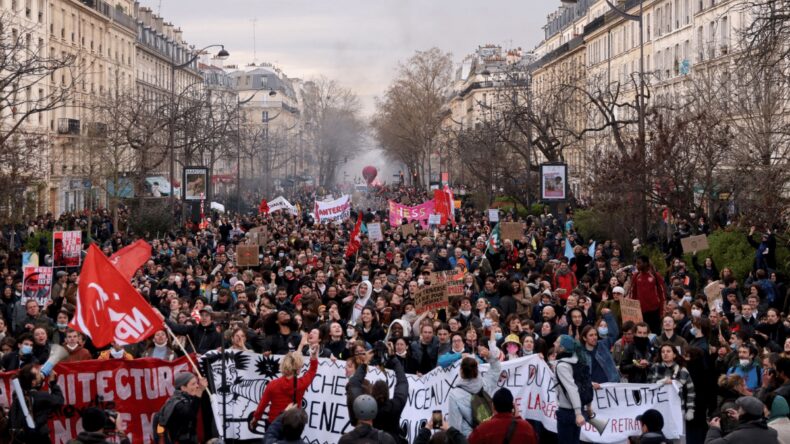Protests against Macron’s pension reform bill in France continue, with opposition parties and unions disputing the need to raise the retirement age for financial stability, causing travel disruption, shortages, and clashes between police and protesters, prompting concerns over police tactics.
Protests against Macron’s pension reform bill

On March 28, protesters in France gathered in various cities to rally against President Emmanuel Macron and his pension reform bill. The bill proposes raising the retirement age by two years to 64, a move that has been met with widespread opposition and strikes since mid-January. Despite the government’s rejection of union demands to suspend and rethink the bill, protests and strikes have continued, with the next nationwide day of protests planned for April 6.
Level of violence

While there were clashes between police and protesters, including black-clad groups setting fire to garbage cans and throwing projectiles at police in Paris, the level of violence was lower than in previous protests. The rallies were largely peaceful, with less destruction and violence than seen during previous protests, such as the ones on March 23.
Government’s use of special powers
The utilization of special powers by the government to pass the bill through parliament without a vote has fueled the intensity of the protests and strikes. The use of special powers has been met with criticism from labor leaders, who say the government must find a way out of the crisis. During the Paris rally, Laurent Berger, the leader of the CFDT union, informed reporters that “we have proposed a way out … and it’s intolerable that we are being stonewalled again.”
Opposition to the bill

Opposition parties and unions argue that there are other ways to balance the country’s finances without raising the retirement age and that the bill has acted as a catalyst for anger over Macron’s policies. Some protesters have brandished banners reading “France is angry.” The protests have evolved into broader anti-Macron sentiment, reflecting public frustration with his policies.
Disruption of travel and shortages

The rallies and strikes have disrupted travel, with rolling strikes in the transport, aviation, and energy sectors continuing. The protests have also led to shortages at fuel stations, with around 17% of all fuel stations in France missing at least one product as of Monday night, according to France’s petroleum association UFIP. The suspension of the weeks-long strike by city garbage collectors, which had resulted in piles of trash around popular landmarks, has brought some relief to both Parisians and tourists.
Injuries and police tactics
The clashes between police and protesters have resulted in injuries, including one man who was knocked out by a police charge in Paris. The incident was captured on live footage from BFM TV and went viral on social media, prompting questions about police tactics and the man’s health. Although the police provided him with assistance, they did not subsequently respond to a request for information regarding his health.
Comparisons to the yellow-vest movement

The level of violence during the protests has drawn comparisons to the yellow-vest movement during Macron’s first term. However, while the protests have been met with clashes and violence, they have also been largely peaceful, with protesters expressing their frustration with the government’s policies.
The ongoing protests and strikes in France against Macron’s pension reform bill reflect public frustration with his policies and the government’s use of special powers to push the bill through parliament. While the rallies have been met with clashes and violence, they have also been largely peaceful, with protesters expressing their opposition to the bill and Macron’s policies. The government’s rejection of union demands to suspend and rethink the bill has only intensified the protests and strikes, with the next nationwide day of protests planned for April 6.













